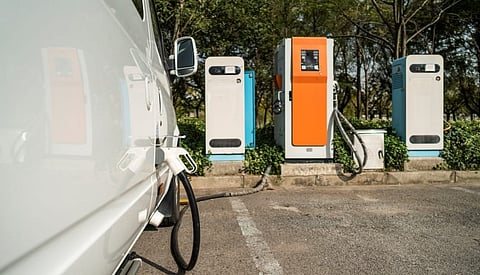
🔧 We’re Under Maintenance
We’ll be back shortly. Thank you for your patience.
We’ll be back shortly. Thank you for your patience.

UK-based Faradion's plans to set up a manufacturing base for its sodium-ion batteries for electric mobility, energy storage and mobile applications marks a major win for Make in India.
Highlights:
UK's Faradion recently announced plans for an initial 1GW capacity sodium-ion manufacturing base in India.
The UK has since become a key green finance partner for India's renewables mission, including a partner country on a series of India-led initiatives like the ISA.
India and the UK also committed £240 million of anchor capital in the Green Growth Equity Fund.
There is a decisive shift in the way the world views China in the aftermath of its handling of the coronavirus pandemic, bringing into question its dominant role as a global manufacturing hub. The need for a diversified supply chain for any industry has become an inevitability in recent months. And, as companies look for affordable and sustainable manufacturing hubs as an alternative, the Make in India programme will take centre stage like never before.
UK-based battery technology major Faradion's recent classification of India as a “priority” big market and plans to launch an initial 1GW capacity sodium-ion manufacturing base in the country comes as a major sign of a dynamic shift away from China.
Faradion's plans are significant in that they pose a direct challenge to Chinese dominance in the lithium-ion battery space, claiming to offer a more superior alternative to the world's mobility needs of the future.
Unlike lithium-ion batteries, the company claims its sodium-ion batteries have “exceptional” thermal stability and safety, which can be safely transported and maintained at zero volts. In recent years, Australia and New Zealand have demonstrated a steady uptake in battery storage in residential, commercial and grid scale applications due to factors including significant reductions in the cost of storage and solar systems, increasing cost of electricity, concerns about blackouts and financial incentives and policies from the government.
Having received its first order from ICM Australia, Faradion CEO James Quinn said: “After Australia, we foresee India as our next priority big market, given the huge growth in mobile devices and a bigger electric mobility market waiting to grow rapidly.
“We have a partner in India with which we plan to scale up manufacturing of Faradion sodium-ion batteries in 2021.”
This latest move comes as a major boost to the wider UK-India sustainability agenda, which dates back some years now with the UK-India Energy Dialogue.
The UK has since become a key green finance partner for India's renewables mission, including a partner country on a series of India-led initiatives such as the International Solar Alliance (ISA).
Most recently, the UK confirmed its partnership as the first co-chair of the Governing Council on the India-led global Coalition for Disaster Resilient Infrastructure (CDRI) in March 2020.
The coalition was established by Indian Prime Minister Narendra Modi as a voluntary international grouping, linking governments, UN agencies, banks, private sector groups, and academia to develop the resilience of infrastructure systems to climate and disaster risks. The Governing Council is the highest policymaking body of the CDRI, co-chaired by India and a representative of another national government nominated by rotation every two years.
The UK was represented at the first council meeting by UK Secretary of State for Business, Energy and Industrial Strategy Alok Sharma. Despite the coronavirus pandemic lockdown, the minister ensured his participation remotely over a video link from the UK.
He said: “Delivering action on climate change remains a priority for the UK and I am sure that the UK-India partnership on climate action will help see progress on reducing emissions and help make India's infrastructure fit for the future.”